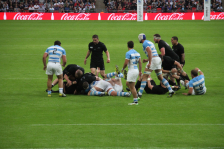Rugby Headlines – the effectiveness of protective headgear in the prevention of concussion injuries in rugby football.
Recent research cited in a
BMJ Open Sport & Exercise Medicine 2018 publication, has stimulated much interest in the topic of the effectiveness of protective headgear with regard to preventing
concussion related rugby injuries. Experts in the Institute of Expert Witnesses have considered this issue and have formed a view in recommending to potential users of protective rugby headgear, to consider all available research, and importantly, the advice and guidance from both World Rugby and the individual national rugby boards.
Whilst individual research provides valuable data and considered conclusions, the IEW would suggest that clear decisions regarding the effectiveness of protective rugby headgear requires considerably more detailed research, and ultimately the publication of a consensus statement from the World Rugby authorities.
The IEW view is consistent with and supported by a recent statement from Mr. Dominic Rumbles, a World Rugby spokesperson who said: “World Rugby and its unions are committed to an evidence-based approach to injury-prevention and while welcoming the study, caution should be exercised when linking the outcomes to a possible reduction in concussion risk as this is yet to be confirmed in extensive peer-reviewed and published research. Padded headgear is approved in rugby as a preventative measure for cuts and abrasions only and the most effective way to prevent injury is through the promotion of correct technique, particularly in the tackle, and strict on and off-field sanctions.”
The latest England Rugby advice is:
“Headguards (sometimes called scrum caps) can help to protect the head from cuts and abrasions, and prevent the development of cauliflower ears. Wearing headguards is permitted on the basis that they should not cause harm or injury to any player and meet World Rugby standards (see World Rugby Regulation 12). However, padded headgear has never been approved or marketed by World Rugby or the RFU to reduce the risk of concussion and there continues to be no conclusive evidence that wearing headguards reduces the chances of sustaining a concussion while playing or training.
Wearing a headguard should be the personal choice of the player/parent. While a headguard can provide some protection (e.g. covering the ears) and confidence (e.g. when introducing players to contact); there is a possibility that wearing protective equipment could potentially change a player’s behaviour. So we would encourage players and coaches not to neglect correct technique, particularly in the tackle and ensure that players are aware of the purpose of headguards and their limitations”.
In conclusion, the IEW experts confirm that apart from the issue of possible behaviour change, (this issue is addressed in the BMJ publication, which states “However, research into the effectiveness of headguards has shown the tackle style and frequency do not change when comparing players wearing a headguard with those who are not”), there is no known reason why protective rugby headgear should not be worn.
It is clear that there are some benefits in relation to the prevention of lacerations and minor superficial rugby injuries to the head. However, it is also clear that further detailed research is required to substantiate the claims that wearing protective headgear, of the type that is currently available, can have any significant effect in reducing the severity of concussion related injuries.
If you have any questions regarding rugby injuries and protective headgear or if you need expert witness advice on a case, please do not hesitate to contact our Expert Witnesses on 0117 986 2194 or at enquiries@iew.org.uk.
